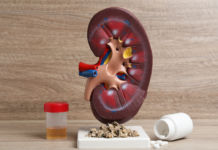Sponsored by: Renadyl™
Kellsey Reed RDN, LDN
If you have CKD, chances are you have sought out interventions to help you manage it in a healthy way. There is a lot of information out there about different drug therapies and lifestyle changes for CKD, specifically probiotics and SGLT2 inhibitors. So how do you know which one is right for you? Instead of choosing one treatment, it may be helpful to speak to your healthcare team/doctor about multiple therapies that work well together.
Therapies and interventions for CKD management
Reducing the complications from chronic kidney disease and slowing its progression is key. Lifestyle changes and medications have been shown to help slow the progression of CKD. These therapies can help reduce/prevent rapid loss of kidney function and decrease complications of CKD. Some common interventions for CKD include implementing a kidney-friendly diet, stress management, physical activity, actions towards better gut health, and drug therapy like SGLT2 inhibitors. Ultimately, the best intervention for your CKD is the one that you and your healthcare team agree upon. Newer research has shown that there are benefits from using SGLT2 inhibitors and probiotics aimed at improving gut health with CKD like Renadyl. But how do they differ?
SGLT2 inhibitors and CKD
SGLT2, or sodium-glucose cotransporter 2, inhibitors are medications that “lower your blood sugar levels by preventing your kidneys from reabsorbing sugar created by your body and the extra sugar leaves through in your urine”(1). This class of medications has also been shown to help reduce poor outcomes associated with type 2 diabetes and CKD. Some benefits include: “decreased intraglomerular pressure and hyperfiltration, reduced proinflammatory and profibrotic processes, and reduced cellular toxicity and oxidative stress.”(2)
SGLT2 inhibitors can also help to reduce blood pressure and weight. Again, this is helpful for those with CKD, as elevated blood sugars and uncontrolled diabetes, hypertension, and obesity can all play a major role in CKD progression.
Managing the complications of CKD is vital for overall health. Overall, SGLT2 inhibitors have been shown to have promising benefits.
Gut health, probiotics, and CKD
Studies show that our gut health is linked to our kidney health because gut-derived uremic toxins are associated with the progression of CKD, cardiovascular disease, and mortality (4). When you have CKD, toxins and waste products can build up in the body and become harmful. This buildup can result in further progression of CKD. Focusing on good gut health can help to reduce the amount of toxins and waste products in the body & therefore help to slow the progression of CKD. It can also help keep your bowel movements regular, especially if you are used to experiencing constipation. If you are protecting your gut health, then you can help protect your kidney health in turn.
This is where probiotics come into play! Probiotics, like Renadyl, help to maintain the balance of good gut bacteria in the body. Renadyl, a unique kidney-focused probiotic, is made with three probiotic microbial strains of beneficial bacteria – S. thermophilus (KB19), L. acidophilus (KB27), and B. longum (KB31) – that have been shown to help remove uremic toxins from the body.
Overall, research shows that maintaining good gut health is essential for managing chronic kidney disease and protecting your kidney health over time. In addition, protecting your good bacteria can help remove more uremic toxins that contribute to further CKD progression from the body. Probiotics can be an excellent tool for protecting your gut health.
SGLT2 inhibitors vs. probiotics for CKD management
SGLT2 inhibitors have been shown to help reduce poor outcomes associated with type 2 diabetes and CKD. Some benefits include: “decreased intraglomerular pressure and hyperfiltration, reduced proinflammatory and profibrotic processes, and reduced cellular toxicity and oxidative stress.”
Despite SGLT2 inhibitors having been shown to help manage some aspects of CKD, there is still some data that shows that they can increase the progression of CKD. This is not ideal for those with late-stage CKD. In addition, some studies show this is a significant safety concern for those with stage 4 or 5 CKD. Research indicates that SGLT2 inhibitors may be more beneficial for those with early stages of CKD. There is also no benefit to gut health from taking SGLT2 inhibitors, as it has not been shown to affect gut dysbiosis.
Enter probiotics, another form of therapy for those with CKD. Unlike SGLT2 inhibitors, probiotics can be safe for those at later stages of CKD. Probiotics are also generally regarded as safe (GRAS) according to the FDA due to their safety profile. Probiotics also offer other health benefits, aside from helping to rid the body of gut-derived uremic toxins in those with CKD. Probiotics can be a great add-on therapy alongside diet and lifestyle changes, as well as medication therapy.
As you can see here, there are benefits to both therapies; both can be good adjunct therapies for CKD management.
The bottom line for CKD management
Ultimately, managing your CKD needs to be doable and realistic for you. There are proven benefits to lifestyle changes, medications, and probiotics with CKD. Talk with your doctor before starting new medications or changing your current therapy regimen.
About the Author
Kellsey Reed is a kidney dietitian. She helps people with CKD learn to eat the foods they love so they can improve their kidney health and live their best life with CKD. As a registered dietitian who specializes in chronic kidney disease, she has been through extensive training to give you the best support and guidance possible. In her career, she’s seen the lack of support given to those with CKD and is on a mission to change that.
“I don’t believe in just giving you a one-page handout that says “eat this” and “don’t eat that”. I don’t believe in telling you to stop going out to eat! I don’t believe in having you cut out all the foods you love in order to manage your CKD! I believe in giving you all of the tools, resources, and support that you need to eat for your CKD with 100% confidence! I believe in helping you learn how to travel, go out to eat at your favorite restaurants, have a date night with your spouse, and celebrate holidays and birthdays with your family without stress, anxiety, or confusion!”
If you’re interested in learning more about Kellsey’s coaching program or the free resources she offers, go to her website: ckdnutrition.com. You can also follow along on Instagram or TikTok at: @ckd.nutrition.coach!
References
- https://www.kidney.org/atoz/content/sglt2-inhibitors#:~:text=SGLT2%20inhibitors%20are%20effective%20at,who%20do%20not%20have%20diabetes.
- https://www.hilarispublisher.com/abstract/differentiating-sodiumglucose-cotransporter-2-inhibitors-from-live-biotherapeutic-products-probiotics-as-novel-therapeut-92254.html
- https://www.ncbi.nlm.nih.gov/pmc/articles/PMC9263228/
- https://www.ncbi.nlm.nih.gov/pmc/articles/PMC7859267/
*These statements have not been evaluated by the US Food and Drug Administration. This information is not intended to diagnose, treat, cure, or prevent any disease. Always consult with a qualified healthcare professional prior to beginning any diet or exercise program or taking any dietary supplement. The content on our website is for informational and educational purposes only.



